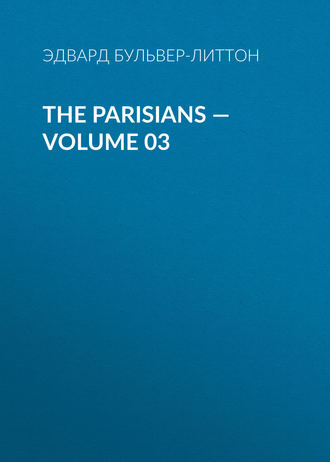
Эдвард Бульвер-Литтон
The Parisians — Volume 03
He placed a paper in Alain's hand, and took out a box, from which he extracted a jujube, placed it in his mouth, folded his hands, and reclined back in his chair, with his eyes half closed, as if exhausted alike by his ascent and his generosity.
In effect, the terms were unexpectedly liberal. The reduced interest on the mortgages would leave the Marquis an income of L1,000 a year instead of L400. Louvier proposed to take on himself the legal cost of transfer, and to pay to the Marquis 25,000 francs, on the completion of the deed, as a bonus. The mortgage did not exempt the building-land, as Hebert desired. In all else it was singularly advantageous, and Alain could but feel a thrill of grateful delight at an offer by which his stinted income was raised to comparative affluence.
"Well, Marquis," said Louvier, "what does the castle say to the town?"
"Monsieur Louvier," answered Alain, extending his hand with cordial eagerness, "accept my sincere apologies for the indiscretion of my metaphor. Poverty is proverbially sensitive to jests on it. I owe it to you if I cannot hereafter make that excuse for any words of mine that may displease you. The terms you propose are most liberal, and I close with them at once."
"Bon," said Louvier, shaking vehemently the hand offered to him; "I will take the paper to Gandrin, and instruct him accordingly. And now, may I attach a condition to the agreement which is not put down on paper? It may have surprised you perhaps that I should propose a gratuity of 25,000 francs on completion of the contract. It is a droll thing to do, and not in the ordinary way of business, therefore I must explain. Marquis, pardon the liberty I take, but you have inspired me with an interest in your future. With your birth, connections, and figure you should push your way in the world far and fast. But you can't do so in a province. You must find your opening at Paris. I wish you to spend a year in the capital, and live, not extravagantly, like a nouveau riche, but in a way not unsuited to your rank, and permitting you all the social advantages that belong to it. These 25,000 francs, in addition to your improved income, will enable you to gratify my wish in this respect. Spend the money in Paris; you will want every sou of it in the course of the year. It will be money well spent. Take my advice, cher Marquis. Au plaisir."
The financier bowed himself out. The young Marquis forgot all the mournful reflections with which Raoul's conversation had inspired him. He gave a new touch to his toilette, and sallied forth with the air of a man on whose morning of life a sun heretofore clouded has burst forth and bathed the landscape in its light.
CHAPTER VIII
Since the evening spent at the Savarins', Graham had seen no more of Isaura. He had avoided all chance of seeing her; in fact, the jealousy with which he had viewed her manner towards Rameau, and the angry amaze with which he had heard her proclaim her friendship for Madame de Grantmesnil, served to strengthen the grave and secret reasons which made him desire to keep his heart yet free and his hand yet unpledged. But alas! the heart was enslaved already. It was under the most fatal of all spells,—first love conceived at first sight. He was wretched; and in his wretchedness his resolves became involuntarily weakened. He found himself making excuses for the beloved. What cause had he, after all, for that jealousy of the young poet which had so offended him; and if in her youth and inexperience Isaura had made her dearest friend of a great writer by whose genius she might be dazzled, and of whose opinions she might scarcely be aware, was it a crime that necessitated her eternal banishment from the reverence which belongs to all manly love? Certainly he found no satisfactory answers to such self-questionings. And then those grave reasons known only to himself, and never to be confided to another—why he should yet reserve his hand unpledged—were not so imperative as to admit of no compromise. They might entail a sacrifice, and not a small one to a man of Graham's views and ambition. But what is love if it can think any sacrifice, short of duty and honour, too great to offer up unknown uncomprehended, to the one beloved? Still, while thus softened in his feelings towards Isaura, he became, perhaps in consequence of such softening, more and more restlessly impatient to fulfil the object for which he had come to Paris, the great step towards which was the discovery of the undiscoverable Louise Duval.
He had written more than once to M. Renard since the interview with that functionary already recorded, demanding whether Renard had not made some progress in the research on which he was employed, and had received short unsatisfactory replies preaching patience and implying hope.
The plain truth, however, was that M. Renard had taken no further pains in the matter. He considered it utter waste of time and thought to attempt a discovery to which the traces were so faint and so obsolete. If the discovery were effected, it must be by one of those chances which occur without labour or forethought of our own. He trusted only to such a chance in continuing the charge he had undertaken. But during the last day or two Graham had become yet more impatient than before, and peremptorily requested another visit from this dilatory confidant.
In that visit, finding himself pressed hard, and though naturally willing, if possible, to retain a client unusually generous, yet being on the whole an honest member of his profession, and feeling it to be somewhat unfair to accept large remuneration for doing nothing, M. Renard said frankly, "Monsieur, this affair is beyond me; the keenest agent of our police could make nothing of it. Unless you can tell me more than you have done, I am utterly without a clew. I resign, therefore, the task with which you honoured me, willing to resume it again if you can give me information that could render me of use."
"What sort of information?"
"At least the names of some of the lady's relations who may yet be living."
"But it strikes me that, if I could get at that piece of knowledge, I should not require the services of the police. The relations would tell me what had become of Louise Duval quite as readily as they would tell a police agent."
"Quite true, Monsieur. It would really be picking your pockets if I did not at once retire from your service. Nay, Monsieur, pardon me, no further payments; I have already accepted too much. Your most obedient servant."
Graham, left alone, fell into a very gloomy revery. He could not but be sensible of the difficulties in the way of the object which had brought him to Paris, with somewhat sanguine expectations of success founded on a belief in the omniscience of the Parisian police, which is only to be justified when they have to deal with a murderess or a political incendiary. But the name of Louise Duval is about as common in France as that of Mary Smith in England; and the English reader may judge what would be the likely result of inquiring through the ablest of our detectives after some Mary Smith of whom you could give little more information than that she was the daughter of a drawing-master who had died twenty years ago, that it was about fifteen years since anything had been heard of her, that you could not say if through marriage or for other causes she had changed her name or not, and you had reasons for declining resort to public advertisements. In the course of inquiry so instituted, the probability would be that you might hear of a great many Mary Smiths, in the pursuit of whom your employee would lose all sight and scent of the one Mary Smith for whom the chase was instituted.
In the midst of Graham's despairing reflections his laquais announced M. Frederic Lemercier.
"Cher Grarm-Varn. A thousand pardons if I disturb you at this late hour of the evening; but you remember the request you made me when you first arrived in Paris this season?"
"Of course I do,—in case you should ever chance in your wide round of acquaintance to fall in with a Madame or Mademoiselle Duval of about the age of forty, or a year or so less, to let me know; and you did fall in with two ladies of that name, but they were not the right one, not the person whom my friend begged me to discover; both much too young."
"Eh bien, mon cher. If you will come with me to the bal champetre in the Champs Elysees to-night, I can show you a third Madame Duval,—her Christian name is Louise, too, of the age you mention,—though she does her best to look younger, and is still very handsome. You said your Duval was handsome. It was only last evening that I met this lady at a soiree given by Mademoiselle Julie Caumartin, coryphee distinguee, in love with young Rameau."
"In love with young Rameau? I am very glad to hear it. He returns the love?"
"I suppose so. He seems very proud of it. But apropos of Madame Duval, she has been long absent from Paris, just returned, and looking out for conquests. She says she has a great penchant for the English; promises me to be at this ball. Come."
"Hearty thanks, my dear Lemercier. I am at your service."
CHAPTER IX
The bal champetre was gay and brilliant, as such festal scenes are at Paris. A lovely night in the midst of May, lamps below and stars above; the society mixed, of course. Evidently, when Graham has singled out Frederic Lemercier from all his acquaintances at Paris to conjoin with the official aid of M. Renard in search of the mysterious lady, he had conjectured the probability that she might be found in the Bohemian world so familiar to Frederic; if not as an inhabitant, at least as an explorer. Bohemia was largely represented at the bal champetre, but not without a fair sprinkling of what we call the "respectable classes," especially English and Americans, who brought their wives there to take care of them. Frenchmen, not needing such care, prudently left their wives at home. Among the Frenchmen of station were the Comte de Passy and the Vicomte de Breze.
On first entering the gardens, Graham's eye was attracted and dazzled by a brilliant form. It was standing under a festoon of flowers extended from tree to tree, and a gas jet opposite shone full upon the face,—the face of a girl in all the freshness of youth. If the freshness owed anything to art, the art was so well disguised that it seemed nature. The beauty of the countenance was Hebe-like, joyous, and radiant; and yet one could not look at the girl without a sentiment of deep mournfulness. She was surrounded by a group of young men, and the ring of her laugh jarred upon Graham's ear. He pressed Frederic's arm, and directing his attention to the girl, asked who she was.
"Who? Don't you know? That is Julie Caumartin. A little while ago her equipage was the most admired in the Bois, and great ladies condescended to copy her dress or her coiffure; but she has lost her splendour, and dismissed the rich admirer who supplied the fuel for its blaze, since she fell in love with Gustave Rameau. Doubtless she is expecting him to-night. You ought to know her; shall I present you?"
"No," answered Graham, with a compassionate expression in his manly face.
"So young; seemingly so gay. How I pity her!"
"What! for throwing herself away on Rameau? True. There is a great deal of good in that girl's nature, if she had been properly trained. Rameau wrote a pretty poem on her which turned her head and won her heart, in which she is styled the 'Ondine of Paris,'—a nymph-like type of Paris itself."
"Vanishing type, like her namesake; born of the spray, and vanishing soon into the deep," said Graham. "Pray go and look for the Duval; you will find me seated yonder."
Graham passed into a retired alley, and threw himself on a solitary bench, while Lemercier went in search of Madame Duval. In a few minutes the Frenchman reappeared. By his side was a lady well dressed, and as she passed under the lamps Graham perceived that, though of a certain age, she was undeniably handsome. His heart beat more quickly. Surely this was the Louise Duval he sought.
He rose from his seat, and was presented in due form to the lady, with whom Frederic then discreetly left him. "M. Lemercier tells me that you think that we were once acquainted with each other."
"Nay, Madame; I should not fail to recognize you were that the case. A friend of mine had the honour of knowing a lady of your name; and should I be fortunate enough to meet that lady, I am charged with a commission that may not be unwelcome to her. M. Lemercier tells me your nom de bapteme is Louise."
"Louise Corinne, Monsieur."
"And I presume that Duval is the name you take from your parents?"
"No; my father's name was Bernard. I married, when I was a mere child, M. Duval, in the wine trade at Bordeaux."
"Ah, indeed!" said Graham, much disappointed, but looking at her with a keen, searching eye, which she met with a decided frankness. Evidently, in his judgment, she was speaking the truth.
"You know English, I think, Madame," he resumed, addressing her in that language.
"A leetle; speak un peu."
"Only a little?"
Madame Duval looked puzzled, and replied in French, with a laugh, "Is it that you were told that I spoke English by your countryman, Milord Sare Boulby? Petit scelerat, I hope he is well. He sends you a commission for me,—so he ought; he behaved to me like a monster."
"Alas! I know nothing of Milord Sir Boulby. Were you never in England yourself?"
"Never," with a coquettish side-glance; "I should like so much to go. I have a foible for the English in spite of that vilain petit Boulby. Who is it gave you the commission for me? Ha! I guess, le Capitaine Nelton."
"No. What year, Madame, if not impertinent, were you at Aix-la-Chapelle?"
"You mean Baden? I was there seven years ago, when I met le Capitaine Nelton, bel homme aux cheveux rouges."
"But you have been at Aix?"
"Never."
"I have, then, been mistaken, Madame, and have only to offer my most humble apologies."
"But perhaps you will favour me with a visit, and we may on further conversation find that you are not mistaken. I can't stay now, for I am engaged to dance with the Belgian of whom, no doubt, M. Lemercier has told you."
"No, Madame, he has not."
"Well, then, he will tell you. The Belgian is very jealous; but I am always at home between three and four; this is my card."
Graham eagerly took the card, and exclaimed, "Is this you're your own handwriting, Madame?"
"Yes, indeed."
"Tres belle ecriture," said Graham, and receded with a ceremonious bow. "Anything so unlike her handwriting! Another disappointment," muttered the Englishman as the lady went back to the ball.
A few minutes later Graham joined Lemercier, who was talking with De Passy and De Breze.
"Well," said Lemercier, when his eye rested on Graham, "I hit the right nail on the head this time, eh?"
Graham shook his head.
"What! is she not the right Louise Duval?"
"Certainly not."
The Count de Passy overheard the name, and turned. "Louise Duval," he said; "does Monsieur Vane know a Louise Duval?"
"No; but a friend asked me to inquire after a lady of that name whom he had met many years ago at Paris." The Count mused a moment, and said, "Is it possible that your friend knew the family De Mauleon?"
"I really can't say. What then?"
"The old Vicomte de Mauleon was one of my most intimate associates. In fact, our houses are connected. And he was extremely grieved, poor man, when his daughter Louise married her drawing-master, Auguste Duval."
"Her drawing-master, Auguste Duval? Pray say on. I think the Louise Duval my friend knew must have been her daughter. She was the only child of a drawing-master or artist named Auguste Duval, and probably enough her Christian name would have been derived from her mother. A Mademoiselle de Mauleon, then, married M. Auguste Duval?"
"Yes; the old Vicomte had espoused en premieres noces Mademoiselle Camille de Chavigny, a lady of birth equal to his own; had by her one daughter, Louise. I recollect her well,—a plain girl, with a high nose and a sour expression. She was just of age when the first Vicomtesse died, and by the marriage settlement she succeeded at once to her mother's fortune, which was not large. The Vicomte was, however, so poor that the loss of that income was no trifle to him. Though much past fifty, he was still very handsome. Men of that generation did not age soon, Monsieur," said the Count, expanding his fine chest and laughing exultingly.
"He married, en secondes noces, a lady of still higher birth than the first, and with a much larger dot. Louise was indignant at this, hated her stepmother; and when a son was born by the second marriage she left the paternal roof, went to reside with an old female relative near the Luxembourg, and there married this drawing-master. Her father and the family did all they could to prevent it; but in these democratic days a woman who has attained her majority can, if she persist in her determination, marry to please herself and disgrace her ancestors. After that mesalliance her father never would see her again. I tried in vain to soften him. All his parental affections settled on his handsome Victor.







